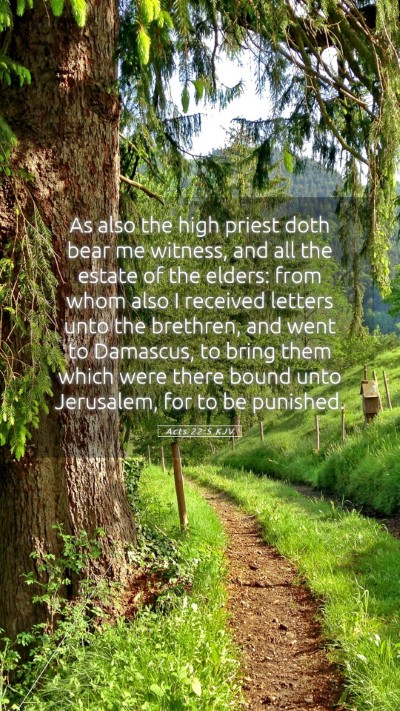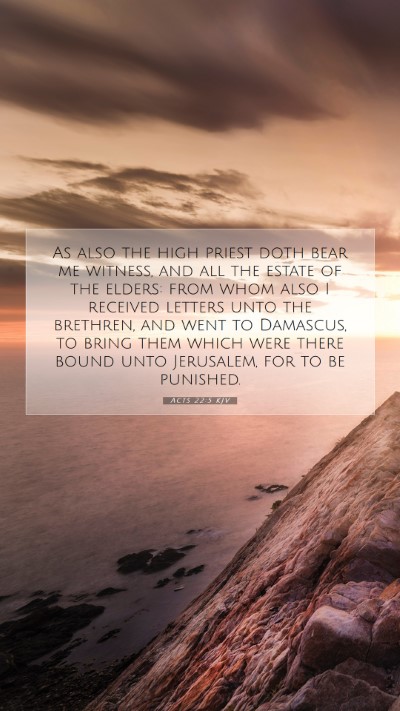Understanding Acts 22:5
Acts 22:5 states:
"As also the high priest doth bear me witness, and all the estate of the elders: from whom also I received letters unto the brethren, and went to Damascus, to bring them which were there bound unto Jerusalem, for to be punished."
This verse is part of Paul's defense before the crowd in Jerusalem, where he recounts his past as a persecutor of Christians. Exploring the meaning of this Bible verse involves understanding its historical context, the character of Paul, and the implications of his transformation.
Verse Context and Interpretation
This section delves into the Bible verse interpretations offered by various public domain commentators, reflecting on the significance of Paul's testimony.
- Matthew Henry:
Henry notes that Paul bears witness to the high priest’s approval of his mission against Christians. It reveals the seriousness of his former life as a Pharisee and the zealous commitment he had toward Jewish law and tradition. Henry underlines the irony of Paul’s journey from a persecutor to a proponent of the faith he once sought to destroy.
- Albert Barnes:
Barnes emphasizes that Paul’s reference to the "high priest" and "elders" provides a powerful confirmation of his past actions. He points out that Paul was genuinely motivated by a misguided zeal for God, believing he was serving Him by persecuting those who followed Christ. This context is crucial for understanding the transformation that follows in Paul's life, making his later apostolic mission strikingly more profound.
- Adam Clarke:
Clarke expands on the political and judicial machinations that allowed Paul to persecute Christians, highlighting the authority he had through the letters received. He explains that Paul was part of the Jewish leadership, giving weight to his narrative of transformation. Clarke notes that the mention of Damascus foreshadows the dramatic encounter Paul will have on the road, underscoring the dramatic shift in his life’s direction.
Historical Context
To fully grasp the Bible verse meaning, it’s essential to consider the historical backdrop. The high priest and the elders were key figures in the Jewish religious hierarchy, and Paul was deeply entrenched in that world. This setting illustrates the tension between early Christians and Jewish authorities, providing profound insight into the challenges faced by the early church.
Key Themes
- Transformation: Paul’s recounting of his previous life serves as a stark contrast to his current mission, emphasizing the theme of Biblical exegesis—the transformation from persecution to preaching.
- Authority and Witness: The references to the high priest and elders signify the weight of Paul’s past and lend credibility to his testimony.
- Error and Zeal: Illustrates the danger of misguided zeal—Paul was fervent in his faith, yet entirely wrong in his actions, showcasing how sincere intentions can stray from truth.
Application to Daily Life
Understanding Acts 22:5 provides valuable lessons for modern believers:
- Self-Reflection: Reflect on personal beliefs and motivations—are they aligned with true understanding of faith?
- Grace and Forgiveness: Highlighting that no one is beyond redemption encourages forgiveness and grace towards others.
- Understanding Scripture: This verse underscores the importance of contextual understanding when interpreting Scripture.
Cross References
Acts 22:5 relates closely to several other Bible verses, which offer additional insight:
- Acts 9:1-2: Paul’s early persecution of Christians.
- Philippians 3:5-6: A recounting of Paul's credentials as a Pharisee.
- 1 Timothy 1:13-14: Paul’s reflections on his past and God’s mercy.
Conclusion
Acts 22:5 serves as a poignant reminder of transformation, zeal, and the power of testimony. Engaging in Bible study groups or utilizing Bible study tools can deepen your understanding of such passages. For those seeking an in-depth Bible verse analysis, the insights provided by historical and contextual frameworks serve to illuminate the paths of Biblical figures like Paul. Through diligent study, believers can apply these insights, fostering a richer spiritual life and understanding of Scripture.


